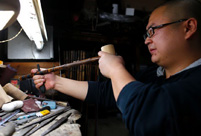Rome, December 19 - Italy has the second-oldest population in Europe after Germany, national statistical agency Istat said Thursday.
"The country's high rate of survival, combined with a decline in fertility, makes Italy one of the oldest countries in the world," Istat said in its annual statistical review.
According to its age index, Italy ranks second in Europe with a measure of 148.6 people over 65 for every 100 young people, aged 14 and younger.
Germany has the oldest population of 155.8 seniors for every 100 youngsters, the agency said.
The average Italian life expectancy is 79.4 years for men and 84.4 years for women.
Meanwhile, Istat said that growth is due only to an increase in its immigrant population.
At the end of 2012, there were 59.7 million residents in Italy, about 291,000 people more than the previous year.
The number of immigrants rose by 369,700 people over the same period.
Deaths in Italy again outpaced births, widening the gap in 2012, the agency said.
Births fell by more than 12,000 to 534,200 in 2012, while deaths increased by nearly 20,000 to about 612,900 last year.
Turning to 2011 data, women that year continued to have fewer children and at a later age than in 2010. The average number of children per woman was 1.39 in 2011, compared to 1.41 in 2010, with Italy ranking fifth in Europe for lowest fertility rate. Italian women ranked among Europe's oldest first-time mothers, giving birth for the first time at an average of 31.4 years of age. The only European countries with older first-time mothers were Ireland and Spain, whose women gave birth at 31.5 years of age. For every 1,000 new marriages in Italy, 500 are breaking apart, with 312 ending in legal separation and 182 in divorce.
Ninety per cent of separated couples share custody of their children, compared to 80% of divorced couples.
Meanwhile, the number of weddings rose after years of decline.
In 2012, there were nearly 210,100 weddings compared to 204,800 in in 2011.
The rate of marriage was 3.5 people per 1,000, among the lowest in Europe.
The majority of weddings - 58.8% - were held in church. However, that number rose to three out of four in southern Italy.
More men than women said they enjoyed good health. After controlling for age, 74.2% of Italian men said they were in good or very good health compared to just 66.8% of women.
Istat suggested the difference may be due to the fact that women live longer than men.
However, more women than men also reported suffering a chronic illness, with the gender gap rising significantly after age 45.
Twenty per cent of all respondents said they suffer from one or more chronic illnesses, while 70.4% of adults reported good or very good health. Geographically, the highest percentage of good health was in northern Italy near the Austrian border in Bolzano with 84.8%. The lowest was in the southern regions of Basilicata and Calabria, at 64.1%.
Istat also found that Italians are increasingly connected to the Internet. In 2013, 60.7% of people said they had an Internet connection at home, compared to 55.5% in 2012. The number of Italians keeping at least one computer at home rose to 62.8%, up from 59.3% the year before.
Out of the 15.14 million households with Internet access, 14.9 million have broadband.
But cell phones continue to dominate Italy, as they are present in 93.1% of households.
After computers and cell phones, Blu-ray DVD players are the next most popular, sitting in 53.8% of households, while digital still cameras slip in at 53.4%. Videogame consoles are far more popular than e-books, providing entertainment in 20.2% of households compared to 5.4%.
 People prepare for upcoming 'Chunyun'
People prepare for upcoming 'Chunyun'  Highlights of Beijing int'l luxury show
Highlights of Beijing int'l luxury show Record of Chinese expressions in 2013
Record of Chinese expressions in 2013 China's moon rover, lander photograph each other
China's moon rover, lander photograph each other 17th joint patrol of Mekong River to start
17th joint patrol of Mekong River to start Spring City Kunming witnesses snowfall
Spring City Kunming witnesses snowfall Heritage of Jinghu, arts of strings
Heritage of Jinghu, arts of strings Weekly Sports Photos
Weekly Sports Photos PLA elite units unveiled
PLA elite units unveiled  China's stealth fighters hold drill over plateau
China's stealth fighters hold drill over plateau Chinese navy hospital ship's mission
Chinese navy hospital ship's mission  "Free lunch" program initiated in NW China
"Free lunch" program initiated in NW China  Rime scenery in Mount Huangshan
Rime scenery in Mount Huangshan DPRK's Kaesong Industrial Complex
DPRK's Kaesong Industrial Complex 'Jin' named the word of the year
'Jin' named the word of the year Day|Week|Month